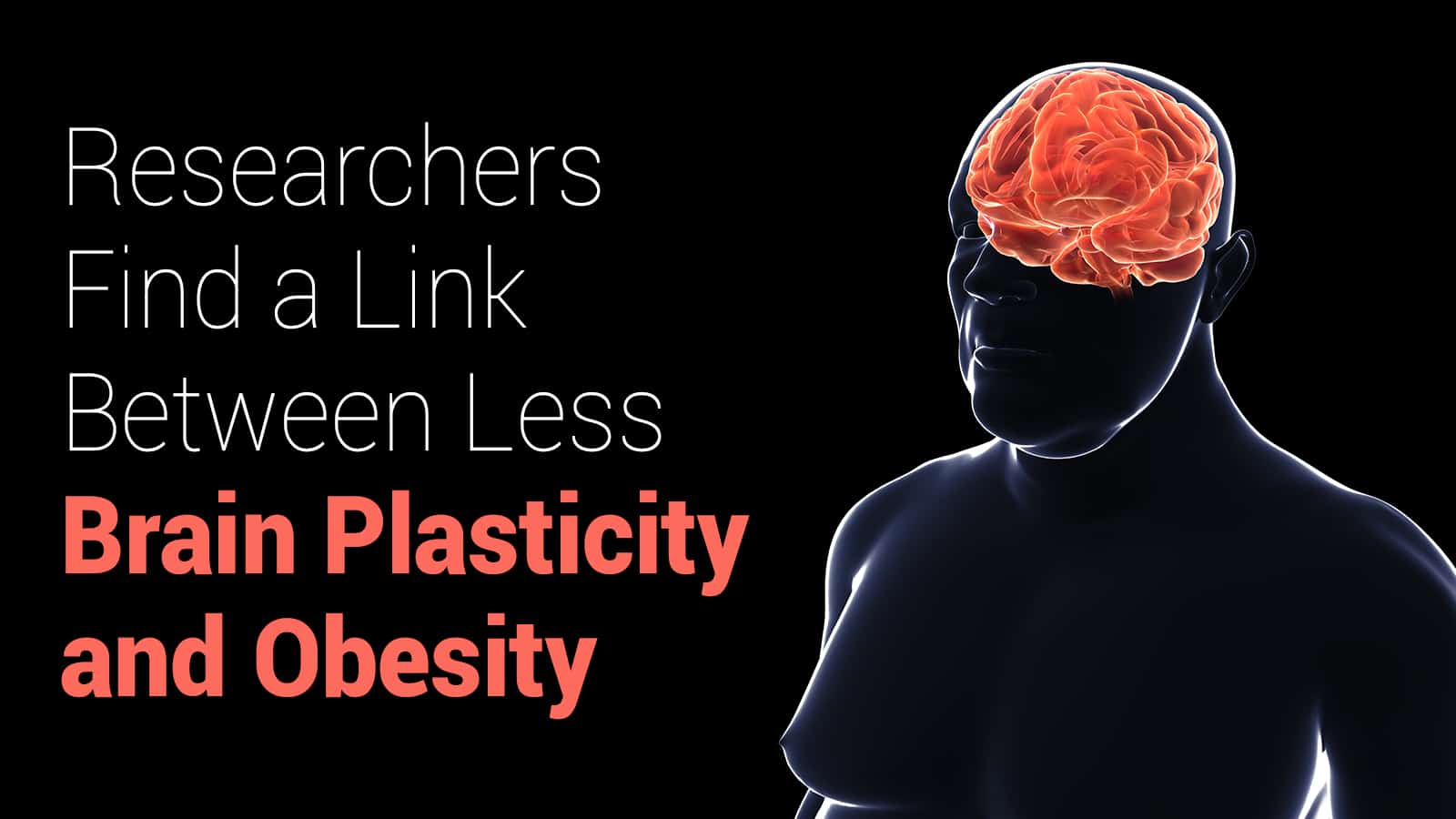Obesity is an ever-increasing concern in the United States. Besides being dangerous to your heart health, new research shows that obesity affects your brain’s ability to function. Here’s what researchers are saying about losing brain plasticity and being obese.
A September 24, 2020 article on Science Daily shares a study published in Brain Sciences. It concludes that obese people have less brain plasticity. This reduced brain functionality means that they are less likely to retain information and might take longer to master new concepts. But what does all that mean? Let’s take an even closer look at the several factors that contribute to obesity. Then, we’ll discuss brain plasticity and share new, healthier habits to boost brain health.
The definition of “obese.”
Approximately 42.5% of Americans are obese, which means that one in every three adults is thought to be overweight enough to be considered obese. Obesity is defined as being more than 20% over your ideal weight. Your perfect weight takes into consideration your height, age, build, and gender. The National Institute of Health says that this number means that your Body Mass Index (BMI) is above 30. You can gauge your BMI by getting your weight in kilograms and dividing it by the square number of your height in meters. There are many online BMI calculators available for easy checking of your BMI. The higher your BMI, the more chance you are of being considered obese.
What causes obesity?
Obesity isn’t just an American problem, but according to some studies, obesity is something like a worldwide pandemic spreading rapidly and contributing to medical, economic, and social issues for many countries. If you’re obese, you’re at risk for some types of cancer, Type 2 diabetes, heart disease, and at a greater risk of getting dementia. So what causes obesity?Poor diet
Being obese develops gradually over time. Eating an unhealthy diet is a significant contributor to obesity which includes
- Eating processed or fast food: These foods are high in sugar and fat.
- Dining out: You tend to eat more when you eat out. If you get an appetizer before your meal, it adds calories. Plus, restaurant foods are often higher in fat.
- Eating large portions of food: It’s easy to overeat if you’re with friends, family, or at a restaurant. You may be surprised at what a normal portion is if you’re used to eating large amounts of food.
- Drinking a lot of alcohol: Alcohol is high in calories and sugar, causing you to gain weight quickly.
- Drinking sugary drinks: Sugary drinks can pack on the pounds.
- Eating for comfort: If you’re sad or depressed, you may be tempted to overeat.
Interestingly, overeating runs in families. If your parents overate, you might have learned bad eating habits while growing up. It can be hard to break the cycle, but if you know your parents ate unhealthy foods like these, you can begin new eating habits.
Sedentary lifestyle
Lack of physical exercise contributes to obesity. Sitting at work all day, watching television, or playing computer games encourage weight gain. It’s recommended that adults get 150 minutes of somewhat intense activity, like walking fast or riding a bike weekly. If you are trying to lose weight, you must need to exercise more often.
Genes
Your genes can contribute to being obese. You may find it a bit more of a challenge to lose weight due to your genes, but it’s not an excuse. Obesity is due more to an unhealthy lifestyle and bad eating habits than genetics.
Medical problems
Sometimes medical problems contribute to being overweight. Diseases like hypothyroidism and Cushing disease make it more challenging to lose weight and keep it off.
- Hypothyroidism: Your thyroid doesn’t produce enough hormones slowing down your metabolism, so you gain weight.
- Cushing’s disease: This rare disease causes your body to make too many steroids. Steroids increase your appetite and fluids in your body, making you weigh more.
- Medications: Taking medications like corticosteroids, medicine for diabetes, or epilepsy also possibly cause weight gain. Also, antidepressants might cause weight gain.
What is brain plasticity?
Neuroplasticity or brain plasticity happens in the neurons of your brain. These are the nerve cells responsible as the building blocks of your brain’s nervous system. Your brain’s plasticity is its adaptability, its ability to change depending upon what’s going on.
Obesity puts you at risk as you age because you’re more at risk for disease or injuries. Having good brain plasticity helps your recovery. Researchers found that a healthy brain can rewire itself. Neuroplasticity not only means your mind can recover better, but you can have a good life afterward.
Besides controlling your weight, here are some other ways you can improve your brain’s plasticity.
-
Get enough sleep
You should get enough sleep to help your brain. Losing sleep prevents your brain’s ability to reset itself. Adults between 34 to 65 need approximately 7 to 9 hours of sleep per night.
-
Learn new things
Whether you learn a new language, take up dancing, or learn to play the piano, learning improves your brain’s plasticity. Any kind of learning activity strengthens your mind and give it more flexibility.
-
Reduce your stress
Stress lowers your brain’s neuroplasticity. Find ways to reduce your stress, including
- Exercise: Physical exercise relieves stress and improves your brain health.
- Going for a walk outside: Nature is a natural cure for stress.
- Mindfulness classes: Mindfulness teaches your brain to get in tune with sights, sounds and smells. Practicing mindfulness can help you relax.
- Yoga: Stretching and breathing exercises in yoga relieve stress and help you feel calm.
- Laughing more: Watch a read a funny book or watch a funny movie-anything to make yourself laugh. Laughing releases chemicals in your brain, making you feel happier and less stressed.
-
Read fiction
Researchers suggest that you read fiction to help your brain’s connectivity. Indeed, they point to this activity as a way to maintain cognitive function throughout a lifetime. Reading is also relaxing, helping to lower your stress levels.
Brain plasticity info you should know
Here are some fun facts about how efficiently this amazing organ works.
- Brainpower: If your brain was hooked up to a light bulb, it could power a low-wattage LED light, which is around 25 watts of electricity.
- Alcohol: Drinking too much alcohol causes your brain to lose the ability to make memories.
- Computer brain: Your brain can compute 10 to the 16th operations per second, meaning your mind can solve problems faster than a computer.
- Speedy brain: Information moves through your brain quickly. The slowest speed that information travels inside your brain? 260 miles per hour!
- Flying brain: Too much jet lag hinders your memory. When you’re jet-lagged, stress hormones get released, causing your memory to diminish.
- The painless brain: Your brain has no pain receptors. That’s why surgeons can do brain surgery on patients while they’re awake.
- Go ahead, daydream: Daydreaming is good for your brain. The regions of your brain that are the most active while you’re resting from tasks are in the place where daydreams are created.
- Call me: Did you know that your brain is generally able to remember a maximum of 7 numbers at one time? That reason is why telephone numbers are seven digits long.
- You can’t do it: Even though you think you can multi-task, researchers say it’s not possible. When you think you’re multitasking, you’re just quickly switching back and forth between two activities in your brain.
- It is not heavy: An adult brain weighs 3 pounds, just 2% of your body’s weight.
- Read aloud: When you read out loud, it encourages your brain’s function.
- Yawn away: Yawning helps your brain cool off. When you are not getting sufficient hours of sleep at night, your brain temperature rises. So, yawn all you want and cool off your brain.
Final Thoughts on Connecting Lowered Brain Plasticity to Obesity
Being excessively overweight is not only unhealthy for your body, but lowers your brain’s ability to adapt to changes. Brain plasticity improves your memory and the overall function of your brain. Obesity’s effect upon the mind is something researchers are just discovering. They’ve found that as obesity increases, so does low brain plasticity. The most significant contributors to obesity are poor eating and a sedentary lifestyle. Your genes and some medications you’re taking could also make it more difficult for you to lose weight.
Fortunately, you can improve your brain’s plasticity at any age by learning something new, lowering your stress, or reading a good novel. Of course, implementing a healthy diet, exercising, and limiting alcohol improves your brain health, too. Your brain is worth protecting. If you’re struggling with being overweight, get help today so you can lose weight and preserve your brain’s plasticity now and in the future.
















 Community
Community

